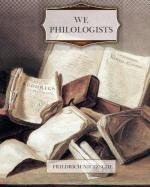13
Vanity is the involuntary inclination to set one’s self up for an individual while not really being one; that is to say, trying to appear independent when one is dependent. The case of wisdom is the exact contrary: it appears to be dependent while in reality it is independent.
14
The Hades of Homer—From what type of existence is it really copied? I think it is the description of the philologist: it is better to be a day-labourer than to have such an anaemic recollection of the past.—[1]
15
The attitude of the philologist towards antiquity is apologetic, or else dictated by the view that what our own age values can likewise be found in antiquity. The right attitude to take up, however, is the reverse one, viz., to start with an insight into our modern topsyturviness, and to look back from antiquity to it—and many things about antiquity which have hitherto displeased us will then be seen to have been most profound necessities.
We must make it clear to ourselves that we are acting in an absurd manner when we try to defend or to beautify antiquity: who are we!
16
We are under a false impression when we say that there is always some caste which governs a nation’s culture, and that therefore savants are necessary; for savants only possess knowledge concerning culture (and even this only in exceptional cases). Among learned men themselves there might be a few, certainly not a caste, but even these would indeed be rare.
17
One very great value of antiquity consists in the fact that its writings are the only ones which modern men still read carefully.
Overstraining of the memory—very common among philologists, together with a poor development of the judgment.
18
Busying ourselves with the culture-epochs of the past: is this gratitude? We should look backwards in order to explain to ourselves the present conditions of culture: we do not become too laudatory in regard to our own circumstances, but perhaps we should do so in order that we may not be too severe on ourselves.
19
He who has no sense for the symbolical has none for antiquity: let pedantic philologists bear this in mind.
20
My aim is to bring about a state of complete enmity between our present “culture” and antiquity. Whoever wishes to serve the former must hate the latter.
21
Careful meditation upon the past leads to the impression that we are a multiplication of many pasts . so how can we be a final aim? But why not? In most instances, however, we do not wish to be this. We take up our positions again in the ranks, work in our own little corner, and hope that what we do may be of some small profit to our successors. But that is exactly the case of the cask of the Danae . and this is useless, we must again set about doing everything for ourselves, and only for ourselves—measuring




